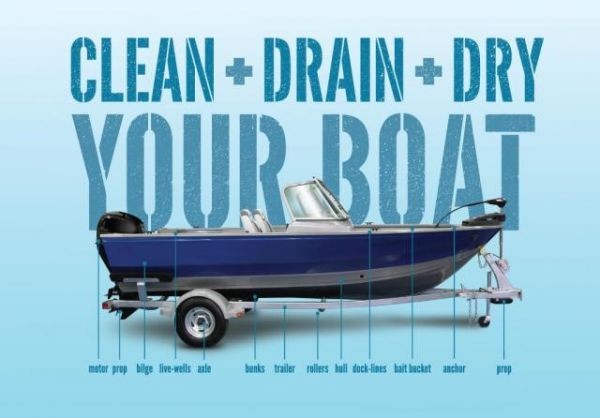By Kelli Saunders (with editing for style)
We tend to hear more and more concern about invasive species, but what are they and how can we help prevent their spread? An invasive species is one that is not native to a specific location (an introduced species), and that has a tendency to spread to a degree believed to cause damage to the environment, economy or human health. Our watershed is vulnerable to introductions of non-native species, aquatic ones in particular, due to its proximity to other water systems and its popularity as a tourist destination. There are a wide variety of aquatic invasive species in our basin and nearby basins. These invasives impact our aquatic ecosystems by competing with native species for resources, such as food and habitat, and can destroy native fish spawning habitats. They are highly successful because they tend to not have any natural predators, they are highly adaptable, they reproduce very quickly and they thrive in disturbed systems. Various species of invertebrates have invaded waters through pathways that include recreational boating, bait bucket release, etc.
So….what can we do as boaters, anglers, resort owners or float plane operators to help prevent these invasions?
Did you know that if you put your boat in a lake that’s infested with an aquatic invasive species, you can threaten the health of the next lake you put your boat into if you don’t take precautions? This is one of the key vectors for the spread of invasives, but there are simple steps each of us can take to minimize the impact. Whether you are a recreational boater, an avid angler/tournament participant, a float-plane operator, a waterfowl hunter or a resort/campground owner, here are some helpful tips to keep in mind…simply, remember “Clean Drain Dry”:
- Clean all visible aquatic plants from your boat, trailer and equipment when
 leaving a waterbody
leaving a waterbody - Inspect and clean your trolling motor as it can easily collect invasive animals and plant debris in shallow water
- If possible, pressure spray your boat and trailer and spray inside compartments with hot water, far from the water’s edge
- Drain your boat, ballast tanks, portable bait containers, motor, drain bilge, livewell and baitwell by removing drain plugs…upland, away from the water and before leaving the lake you were on; keep drain plugs out and water-draining devices open while transporting watercraft
- Allow your boat and equipment to dry in the sun as long as possible (5 days) before putting it into a different waterbody
- You cannot dispose of unwanted bait bucket contents into any waterbody. If using live bait, buy local. Unused bait, including night crawlers, should be put in the garbage. For more information on Minnesota Bait Regulations, go to; https://www.dnr.state.mn.us/fishing/regs
- Waterfowl hunters – clean plants and mud from your boat, motor, trailer, waders/hip boots, decoy lines, anchors, pushpoles and ATV
- For float plane operators, pump out floats into a sealable container and dispose upland
- Resort and campground owners, be sure your guests have helpful information available to them – pamphlets upon check-in or signs at your access points to alert customers to best practices
For more information go to; https://www.dnr.state.mn.us/invasives/ais/index.html
If you see an aquatic invasive species, take a photo, note your location, and report it to your local invasive species organization to help prevent their spread!
In Minnesota
- call 1-218-616-8102
- https://www.eddmaps.org/
Kelli Saunders, M.Sc., is the International Watershed Coordinator with the Lake of the Woods Water Sustainability Foundation.
 leaving a waterbody
leaving a waterbody